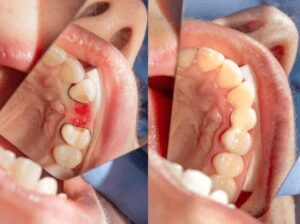If you’re missing one or more teeth, you may consider dental bridges as a restorative solution. However, you might wonder: do dental bridges hurt? The good news is that the process of getting a dental bridge is typically painless, thanks to modern dental techniques and local anesthesia.

Do Dental Bridges Hurt?
Many patients express concern about the potential pain of getting a dental bridge. However, the process itself is generally painless. Your dentist will administer local anesthesia to numb the area, ensuring you remain comfortable throughout the procedure. This means you won’t experience any pain during the bridge preparation, including tooth preparation and impression-taking.
Your dentist will meticulously design the bridge to fit seamlessly with your natural teeth, promoting both functionality and aesthetics. Once the bridge is ready, it will be bonded securely in place, typically without causing discomfort.
However, it’s worth noting that some individuals may experience mild sensitivity or discomfort in the days following the placement of a dental bridge. This is a normal response as your mouth adjusts to the new restoration. Over-the-counter pain medications can help alleviate any minor discomfort during this transition period. If the discomfort persists or worsens, it’s important to consult your dentist, as an underlying issue may require attention.
Benefits of Dental Bridges for Oral Health
Beyond the question of discomfort, dental bridges offer several oral health benefits that go beyond simply restoring your smile.
Restored Function
Missing teeth can hinder your ability to bite, chew, and speak properly. Dental bridges bridge the gap left by missing teeth, restoring full functionality to your bite. With a dental bridge in place, you can enjoy your favorite foods, speak clearly, and regain confidence in your smile.
Preservation of Natural Tooth Alignment
When a tooth is lost, neighboring teeth can shift and become misaligned over time. This can lead to bite problems, jaw discomfort, and even further tooth loss. By filling the gap with a dental bridge, you maintain proper alignment and prevent potential issues associated with tooth movement.
Maintenance of Facial Structure
Missing teeth can cause facial sagging and a prematurely aged appearance. Dental bridges support the lips and cheeks, helping maintain the natural shape of your face. This can enhance your facial aesthetics and boost your self-confidence.
Prevention of Bone Loss
When a tooth is lost, the underlying jawbone can begin to deteriorate. This occurs because the tooth root’s stimulation to the jawbone is lost. Dental bridges help preserve the jawbone by providing necessary stimulation through the replacement teeth. Dental bridges promote long-term oral health and preserve your facial structure by preventing bone loss.
Improved Speech
Missing teeth can impact your ability to pronounce certain sounds correctly, affecting your speech. Dental bridges restore the proper alignment of your teeth, allowing you to speak clearly and confidently without any hindrances.
Enhanced Self-Confidence
Having a complete, healthy smile can significantly boost your self-esteem and confidence. Dental bridges fill the gaps missing teeth leave, giving you a complete, natural-looking smile. This can positively impact your personal and professional interactions, allowing you to smile confidently and enjoy a higher quality of life.
